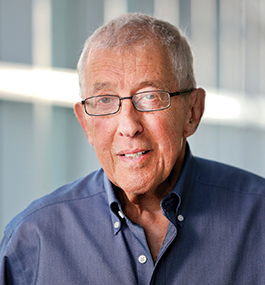‘He Transformed So Many Lives, and I’m Grateful To Be One of Them’

Mike Lovett
Gordie Fellman, in 2017
Sociology professor Gordie Fellman, who taught and mentored Brandeis students for nearly six decades, died Oct. 19. He was 88.
Fellman inspired generations of students to question their assumptions and broaden their perspectives in courses on war, peace, class structure, the Israeli-Palestinian conflict, social change, Freud, and Marx.
He was the author of the 1998 book “Rambo and the Dalai Lama: The Compulsion To Win and Its Threat to Human Survival,” which he was updating at the time of his death.
Fellman won the university’s Louis Dembitz Brandeis Prize for Excellence in Teaching in 1999 and the Student Union Best Teaching Award eight years later. In 2021, the Peace and Justice Studies Association honored his dedication to peace education by presenting him its Peace Educator-Scholar Award.
When Fellman retired in June, he noted, “I’ve had an endless stream of outstandingly smart, challenging, eager, decent students to flavor my Brandeis career.”
Here, several of those students describe his lasting influence on their lives.
“In my sophomore year, I took a course called Social Class, Freedom, and Equality, and my life was forever changed. Gordie Fellman, in his soft voice, forced me to reconsider all my foundational beliefs, to see not just that the globe spun in its orbit, but what forces made it so. My eyes were opened; a new way of thinking began.
“Through the years, Gordie’s influence on me remained solid. I once asked him to come to New York City to participate in a debate on Israeli policy for an organization I was involved with. He objected to the word ‘debate’ as being too adversarial: There was a way for people to discuss issues without the us-them mentality, he said. His teachings continue to inspire my negotiating approach to achieving agreement in my practice as an attorney.
“As I wind my way through life, I often have internal discussions about the morality of my choices. ‘What would Gordie do?’ influences my way of thinking, even when I disagree with what I think he would say. I ask the questions he taught me to identify and make the quest for more justice an underpinning of my own actions as I advocate on a range of issues, most especially expanding access to women’s health treatments and teaching younger women to use their voices.
“I just wish I could adopt his soft voice in my self-expression.”
— Risa Levine ’83
“[When I met Gordie,] I was heavily involved with the Waltham Group, and Gordie encouraged me to do research on low-income housing in Waltham. Gordie’s support and mentoring helped shape my future in the areas of social justice and education, and eventually led to my choice of a career in public education. As a teacher, administrator, and program director, I have always placed a high priority on supporting the people with whom I work. This ‘people focus’ was an important part of what Gordie gave me.”
— Mark Kaufman ’71
“I took an introductory sociology course with Gordie, which satisfied a requirement for my physics major. It opened me to more-humanistic understandings of life’s meaning, an awareness that made possible my career of more than 50 years as a Unitarian Universalist minister.
“Often in life, a change of direction is a matter of a tipping point after many influences. However, once in a long while, one can point to an individual who makes that change possible, not in a dramatic fashion but by a general persuasion to open one’s perspective. Professor Fellman was one of those people for me.”
— Randolph Becker ’68
“I met Gordie in 1994 when I entered the doctoral program in sociology and really got to know him around 1996-97 when Christian Churchill, GSAS PhD’00; Mathew Johnson, GSAS MA’00, PhD’03; and I approached him to become our adviser for a collaborative project on masculinities. Gordie got a kick out of the three of us and all we were trying to do, and he encouraged us, pushing us to keep pressing on existing boundaries of thought.
“My biggest regret is I never took a class with him. He was on my dissertation committee and then chaired my dissertation. His gracious offer to do that is the reason I finished at Brandeis and became a professor. His belief in me and my work was without parallel. [He was] the epitome of a mensch. Brandeis is better because of the fingerprints he’s left on it. And I’m better also.
“What would I like to say to him? That he transformed so many lives, and I’m grateful to be one of them.”
— Deborah J. Cohan, GSAS PhD’05
